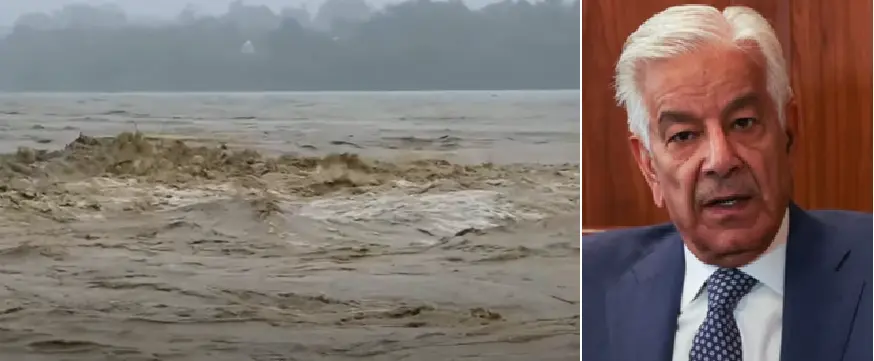
Pakistan’s flood crisis deepens as bizarre claims by Khawaja Asif spark outrage
A Nation Under Water: Pakistan’s Flood Crisis
Shocking Blame Game: Khawaja Asif’s Dead Body Claim – Pakistan is facing one of its worst flood disasters in decades. Heavy monsoon rains have caused rivers like the Sutlej, Ravi, and Chenab to overflow, flooding thousands of villages and displacing over a million people. In Punjab province alone, more than 1.46 million people have been affected, with hundreds of lives lost and crops destroyed. The government has launched massive evacuation efforts, moving over 150,000 people to safer areas.
Despite the scale of the disaster, the focus has shifted from rescue operations to political drama. Instead of addressing the root causes, poor infrastructure, lack of flood management, and climate change, some leaders are pointing fingers elsewhere.
The Shocking Statement: “Dead Bodies from India”
During a visit to flood-hit areas in Sialkot, Pakistan’s Defence Minister Khawaja Muhammad Asif made a statement that stunned many. He claimed that floodwaters entering Pakistan from India were carrying dead bodies, livestock, and debris. According to him, these waters created problems for local teams trying to drain flooded areas.
Asif said, “Floodwater is carrying dead bodies from India,” and added that locals had seen corpses swept across the border. He blamed India for the flooding, even though Indian authorities had issued flood warnings to Pakistan days earlier, helping them evacuate thousands of people.
This claim sparked outrage and ridicule across social media. Many Pakistanis criticized the minister for making such bizarre statements instead of focusing on real solutions. Some accused him of trying to distract the public from the government’s failure to prepare for the floods.
India’s Role: Warning, Not Wreckage
Contrary to the minister’s claims, India had actually helped Pakistan by sending flood alerts. Despite the suspension of the Indus Waters Treaty after the Pahalgam terror attack, India shared real-time data on rising water levels “on humanitarian grounds”. This allowed Pakistan to carry out timely evacuations and save lives.
Indian officials opened gates of major dams in Kashmir due to heavy rainfall, which led to increased water flow downstream. But they informed Pakistan in advance, warning about possible flooding in rivers that cross the border. This was the first diplomatic contact between the two countries in months, and it was aimed at public safety not political blame.
Experts say that blaming India for the floods is misleading. The real issue lies in Pakistan’s outdated infrastructure, lack of flood control systems, and poor urban planning. Without proper drainage and dam systems, even moderate rainfall can lead to disaster.
Politics Over People: What Needs to Change
Khawaja Asif’s statement is just one example of how political leaders sometimes use crises to shift blame. Instead of focusing on helping flood victims, the conversation turned toward international accusations. This kind of rhetoric can damage diplomatic relations and distract from the urgent needs of the people.
Pakistan’s floods are a wake-up call. The country needs better flood management systems, stronger infrastructure, and more cooperation with neighbors. Climate change is making weather patterns more extreme, and without preparation, disasters like this will keep happening.
Citizens and experts alike are calling for accountability. They want leaders to stop making excuses and start taking action. Relief efforts, medical aid, and rebuilding plans should be the priority not bizarre claims and political drama.
Shocking Blame Game- Final Thought:
Pakistan’s devastating floods have displaced millions, but instead of focusing on relief, bizarre political claims are stealing the spotlight. Defence Minister Khawaja Asif’s statement about “dead bodies from India” has sparked outrage, raising questions about leadership, diplomacy, and disaster preparedness in a time when unity is most needed.
Floods don’t care about borders, and neither should compassion. While nature unleashes its fury, it’s up to humans to respond with wisdom, cooperation, and empathy. Let’s hope future headlines focus more on solutions than on sensationalism.
Also read – “Like Doomsday”: Pakistan Monsoon Catastrophe Leaves Over 320 Dead and Entire Villages Erased
Stay informed with the latest news and updates – only on Rapido Updates.